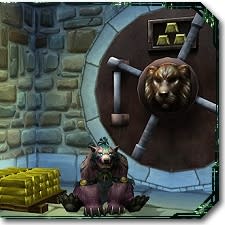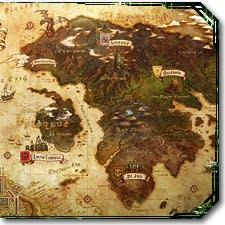EVE Evolved: Designing EVE Onland, part 2
When it comes to living sandbox MMOs, there really isn't a bigger name than EVE Online. Throughout its decade-long history, EVE has produced some huge gaming headlines, delivered record-breaking in-game thefts and heists, and played host to the complex political machinations of dozens of warring alliances. EVE's sandbox design has even made it remarkably resistant to changes in the market, with subscription numbers remaining relatively stable in the face of new releases and the free to play phenomenon. It comes as no surprise then that the sandbox genre is seeing a triple-A revival, with games like Star Citizen, EverQuest Next Landmark, and Camelot Unchained on the way.
With the sandbox genre due to explode back onto the fantasy scene, I've been left wondering how much of the core gameplay that makes EVE tick could be easily adapted for an avatar-based game on land. Even features such as EVE Online's trademark territorial warfare and player-run economy have roots in classic fantasy MMOs like Ultima Online, so they should be easy to convert to modern fantasy equivalents. Last week I started this game design thought experiment with a territorial warfare system and free-for-all PvP with harsh consequences for attackers, but there's a lot more to a good sandbox than smashing people's heads in.
In this week's EVE Evolved, I delve into the hypothetical world of EVE Onland again and tackle issues of realistic world scale, exploration, economics, and the evils of global banking.
Global banking can kill communities
Pretty much every MMO today has some form of bank system that lets you safely stash your items away and retrieve them later. Most use a shared storage model that ensures your items are magically available from a bank in one town even if you deposited them in another, but this is fundamentally at odds with the sandbox philosophy.
One of EVE's core elements is the idea that every item exists in a single discrete location and must be physically moved to a new location if it's needed elsewhere. This may not seem a big deal, but it naturally leads to each player setting up a home base in a particular solar system and spending most of his game time in that constellation or region.
Creating regional communities can do wonders for a sandbox: Seeing the same faces in your general vicinity each day inevitably leads to friendships and conflict, and feeling as if you've got a home somewhere in the universe can be a very strong motivator to keep playing. For EVE Onland, we'd have to use a similar system that keeps banked items in the town that they were banked with. If you need quick access to item storage somewhere out in the wilderness that's far from a town, you'd have to use hide chests somewhere that other players hopefully wouldn't find them. This opens the possibility of producing a whole series of structures for housing and protecting your assets on your own terms.
World scale and exploration
Players logging into EVE Online for the first time are often struck by the sheer scale of the universe and how slow travelling seems to be. It can take hours to travel from one side of the map to the other, and each solar system contains a mind-boggling amount of empty space with no content. In contrast, the modern fantasy MMO takes place on content-rich "continents" that are actually the size of tiny islands. Though the EVE universe is massive in scale, the trick is that there are actually very few points of interest per solar system. Most of the game is empty space without anything interesting in it and is just used to increase travel times.
The same could be achieved in a land-based MMO with the magic of procedural generation. Rather than having level designers slave over every detail of a small zone packed with content, the world would be defined by a series of complex algorithms. Actual continents could be generated on a realistic scale using this technique, and it would be up to players to explore this new world the slow way. Explorers could even build their own dirt paths and roads for horses or wagons to follow, and create maps of safe travel routes and points of interest to sell to other players.
I honestly think a good sandbox game needs a world that's so massive in scale that there could potentially be undiscovered treasures anywhere. EVE Online makes good use of its empty space by spawning things like hidden pirate infestations and asteroid belts in random locations and inviting explorers to find them with scan probes. Our hypothetical EVE Onland game could easily use this mechanic by spawning content in the middle of nowhere and letting players use some kind of magic compass and teleport spell to track it down. An example might be a group of orcs spawning and setting up a small camp, which could then escalate to raiding parties hitting players on a nearby road if it's not found and dealt with. Dungeon entrances could similarly be uncovered anywhere in the landscape and collapse a few days after completion.
Travel speed and distances
Travel in land-based MMOs is usually streamlined with the addition of flight paths, teleport gates, and waypoints to give players instant access to content. While I can agree with the convenience of teleporting, the implementation most games use would be fundamentally at odds with sandbox game design. Letting players teleport from town to town wouldn't actually be a problem in EVE Onland as long as they can't bring any gear or items with them. The real problem with fast travel systems is the ability to move items and materials from one place to another with no risk or time invested.
If players had to physically carry items and materials from one place to another by hand, on horseback, or with wagons, long-distance or treacherous trade routes would naturally be valuable to those who can figure them out. Items would also naturally tend to be cheaper where they're produced and more expensive the further away from a production location you get. Resources could be spread strategically around the map to reinforce this regionalisation, with one region being great for metalwork and another for timber etc.
Natural market forces would then become the driving force behind exploration and territorial conflict, as players aim to find and claim strategic resources near cities where those products are in low supply. It would be up to players to build an industrial infrastructure to take advantage of strategic resources and then work out how to transport and sell their wares throughout the game. Hitting an alliance's supply shipments was a valid war tactic in EVE before jump drives provided a safe way to transport items, so the same strategies would also likely emerge in a fantasy game when similarly constrained.
There are several big sandbox games on the way, some competing directly with EVE's sci-fi niche and others taking a fresh look at the fantasy genre. I've been holding my breath for a new fantasy MMO that could hold a candle to EVE Online, but so far none has managed to capture the same political shenanigans, exploration gameplay, and economic models.
Game mechanics like banking and fast travel are often thought of as inconsequential conveniences that just remove needless time sinks from MMOs, but some implementations can be fundamentally at odds with the sandbox design philosophy. By adding separate bank space for each city and removing the ability to fast-travel with items, designers ensure that both features can be preserved without breaking the inner workings of the sandbox. The big hurdles developers still need to overcome to deliver the ultimate land-based fantasy sandbox is procedural generation and a distributed server model that can put everyone in a single shard.

Brendan "Nyphur" Drain is an early veteran of EVE Online and writer of the weekly EVE Evolved column here at Massively. The column covers anything and everything relating to EVE Online, from in-depth guides to speculative opinion pieces. If you have an idea for a column or guide, or you just want to message him, send an email to brendan@massively.com.






